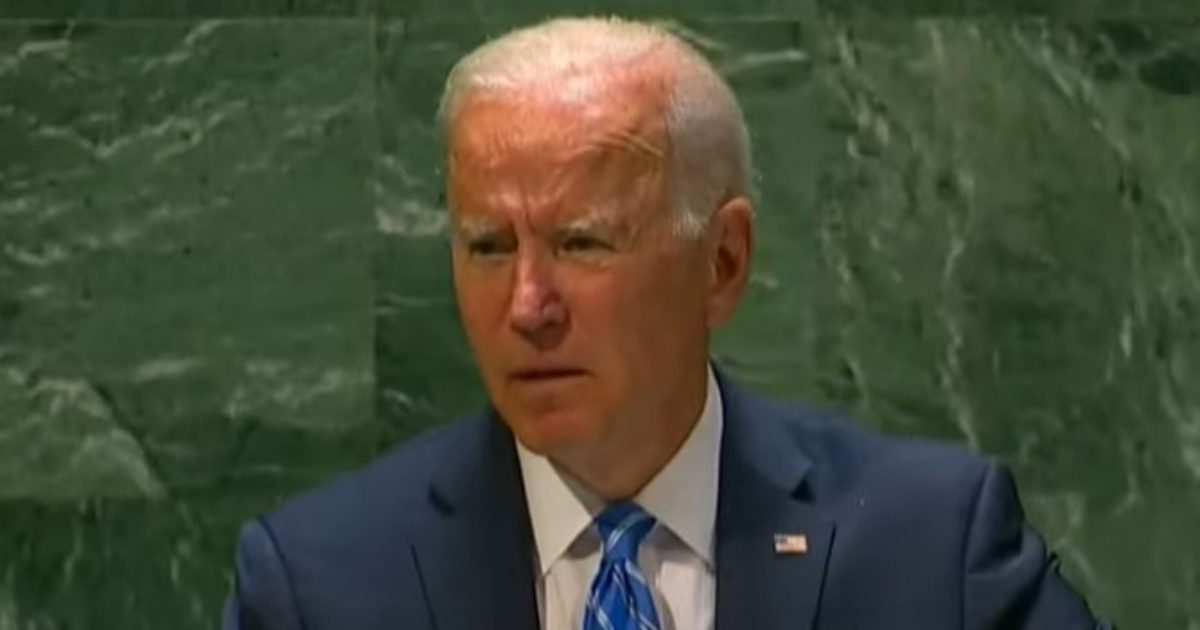Joe Biden gave his first speech to the United Nations General Assembly this morning.
During the speech, Biden focused mostly on COVID-19 and climate change.
He only briefly touched on his failed withdrawal from Afghanistan, and patted himself on the back in the process by saying:
“We’ve ended 20 years of conflict in Afghanistan.”
He then continued:
“And as we close this period of relentless war, we’re opening a new era of relentless diplomacy.”
Biden also falsely claimed to have “revitalized” America’s alliances, despite the fact that France won’t take his phone calls and the UK condemned his Afghanistan withdrawal.
Critics are calling the speech an ’embarrassment.’
Biden focused on climate change and COVID-19, and barely mentioned Afghanistan.
Here's more on the embarassing content of biden's speech from the Washington Examiner:
President Joe Biden implored world leaders to work together during his inaugural United Nations General Assembly address as his own recent diplomacy missteps diluted his message.
Biden's speech marked an end to former President Donald Trump's "America First" foreign policy framing. Biden boasted about the reengagement of the United States with the World Health Organization and the Paris Climate Accord, telling delegates that "our own success is bound up in others succeeding as well."
"To deliver for our own people, we must engage deeply with the rest of the world. Our security, prosperity, and our very freedom are interconnected as never before — and so we must work together as never before," he said.
Biden cited the growing number of transnational problems, including the coronavirus pandemic and climate changes, that require international cooperation.
"Bombs and bullets cannot defend against COVID-19," he said. "To fight this pandemic, we need a collective act of science and political will."
“We will lead not just by the example of our power but, God willing, by the power of our example,” Biden said.
Along with the Iran nuclear deal and a two-state solution in the Middle East, Biden also referenced his botched withdrawal of U.S. troops from Afghanistan. The withdrawal angered allies, who contend they were not kept apprised of the president's decisions.
"As we close this period of relentless war, we're opening the new era of relentless diplomacy, using the power of our development aid to invest in new ways and lifting people up around the world," Biden said. "U.S. military power must be our tool of last resort, not our first, and should not be used as an answer to every problem we see around the world."
Biden's Inaugural United Nations General Assembly Address
Biden: "We’ve ended 20 years of conflict in Afghanistan, and as we close this period of relentless war, we’re opening a new era of relentless diplomacy."
Biden pretended that his Afghanistan withdrawal was a success, and got called out for it on Twitter:
Biden is facing an uphill battle everytime he delivers a speech, especially considering how badly his foreign policies have been.
As Fox News pointed out Tuesday morning, Biden's "America is Back" slogan likely wasn't going to hold water in this speech following his failure in Afghanistan, as well as his recent dispute with France:
President Biden is set Tuesday morning to deliver his first address at the United Nations General Assembly since taking office, facing his international peers following the United States' chaotic withdrawal from Afghanistan, amid tensions with France after a new trilateral agreement with the United Kingdom and Australia, all while the world continues to grapple with COVID-19.
The president is set to address the United Nations General Assembly in New York City, with administration officials describing the event as a "huge opportunity" for Biden.
Asked about the multiple crises facing the Biden administration, White House press secretary Jen Psaki said this is "what you do as president."
"You navigate crises, you weather storms and we’re certainly doing that right now," Psaki said on "CBS This Morning."
"But this is a huge opportunity today for the president. He has obviously been on the world stage for a long time, but he’s going to say to the world, to all of the leaders in the room, we’re not looking inward," she said. "After we end a 20-year war, we’re going to look outward and we’re going to prioritize what’s most important to address – whether that’s the climate crisis, whether that’s cyber threats, continuing to work with partners on counterterrorism."
She added: "And that’s what we need to have our resources and focus and our eyes on – and we’re going to do that through rebuilding our allies and partners."
Biden, so far, has ignored questions about the United States’ chaotic withdrawal of all military assets from Afghanistan, which was complete on Aug. 31, after the country fell to the Taliban.
The U.S. evacuated more than 124,000 individuals – including at least 6,000 Americans citizens, and thousands more Afghan allies and partners. Thirteen U.S. service members were killed during the withdrawal. At least 100 Americans who wanted to leave were left behind, the administration said.
Biden has also come under pressure from France after French President Emmanuel Macron recalled its ambassadors from the U.S. and Australia following a new trilateral agreement focused on the Indo-Pacific between the United States, the United Kingdom and Australia (AUKUS). The agreement is set to focus on developing Australia’s nuclear-powered submarine capabilities – an effort France was working to undertake with Australia. France previously made an agreement to send French-made submarines to Australia.
The French are insisting on explanations and clarifications this week when Biden and Macron connect over the phone. Psaki explained that Biden will attempt to reassure the "key partner and ally" but said the U.S. has no intention of withdrawing from the AUKUS agreement.



Join the conversation!
Please share your thoughts about this article below. We value your opinions, and would love to see you add to the discussion!